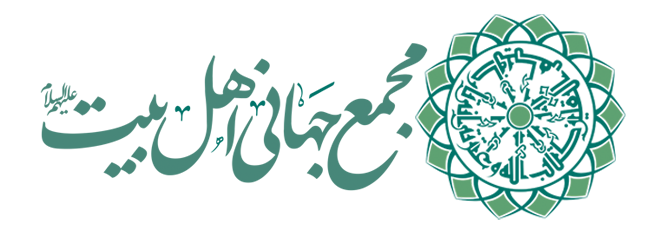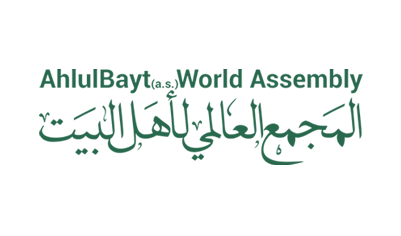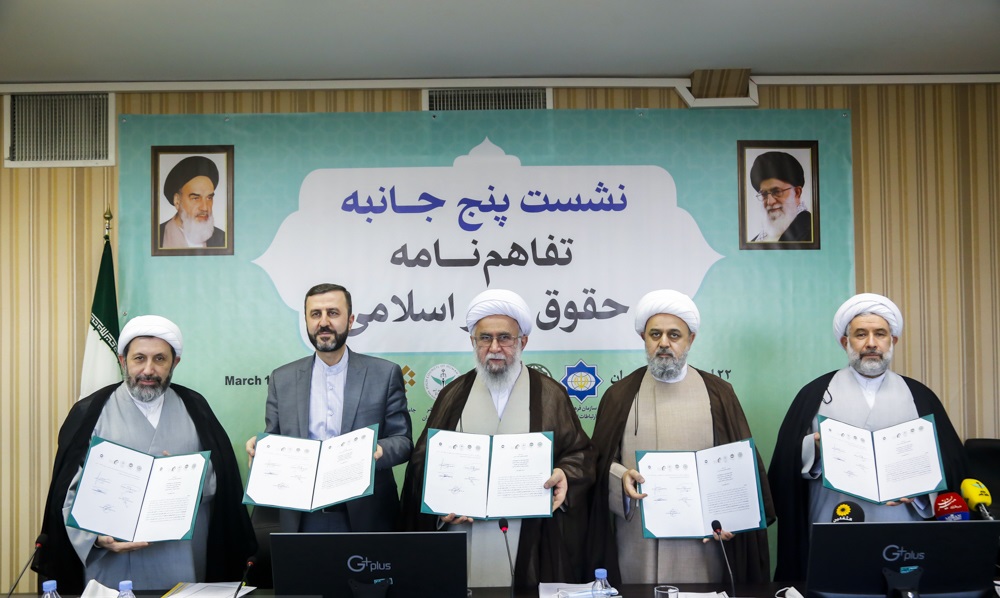Memorandum of Understanding on Islamic Human Rights at AhlulBayt (a.s.) World Assembly
Considering human rights as a trans-organizational issue, the Secretary-General of the AhlulBayt (a.s.) World Assembly added, “Every human conscience considers the defending human rights as an indisputable principle. Today, unfortunately, we face the lack of timely action by international organizations on various issues, including Yemen, Afghanistan, Bahrain, as well as the execution of 81 people in Saudi Arabia, 41 of whom were Shiites.”
On Sunday, March 13, 2022, a five-party meeting was held on the Memorandum of Understanding on Islamic Human Rights between the AhlulBayt (a.s.) World Assembly, the Al-Mustafa (p.b.u.h) International University, the World Forum for Proximity of Islamic Schools of Thought, the Islamic Culture and Communication Organization, and the High Council for Human Rights of the Judiciary.
The meeting, which was held at the AhlulBayt (a.s.) World Assembly in Tehran, was attended by Ayatollah Reza Ramazani, Secretary-General of the AhlulBayt (a.s.) World Assembly, Hojat al-Islam Dr. Hamid Shahriari, the head of the World Forum for Proximity of Islamic Schools of Thought, Hojat al-Islam Mahdi Imanipour, the head of the Islamic Culture and Communication Organization, Dr. Gharibabadi, Deputy for the International Affairs and Human Rights of the Judiciary, and Hojat al-Islam Abbasi, President of Al-Mustafa (p.b.u.h) International University.
Ayatollah Ramazani: Defending human rights, headline of all Islamic teachings
In his speech at the meeting, Ayatollah Reza Ramazani, Secretary-General of the AhlulBayt (a.s.) World Assembly, said, “Islam emphasizes all-round dignity, but some people use deceptive tools and expressions to achieve their goals.”
“Given the emphasis the Islam placed on man, the comprehensiveness of man, and human dignity, it is necessary to work in this field with international literature. We must put aside the passive approach and be actively involved in international law,” he said.
“The five-party memorandum, with an educational-research approach, can pursue research work, especially in various topics in today’s world, and the doubts that people raise about Islam,” stated the Member of the Assembly of Leadership Experts.
“Anti-Islamism, Shiaphobia, and Iranophobia are prevalent in the West, and in the international community, Islam is always associated with untrue attributes. said Ayatollah Ramazani, referring to the many problems that Muslims face in different countries.
“Every human conscience considers the defending human rights as an indisputable principle. Today, unfortunately, we face the lack of timely action by international organizations on various issues, including Yemen, Afghanistan, Bahrain, as well as the execution of 81 people in Saudi Arabia, 41 of whom were Shiites. This is unprecedented in the history of Saudi Arabia. With the tragic events that are taking place in the world, some international organizations only suffice with expressing concern. However, operational measures must be taken to prevent crimes that occur in human society,” added the Secretary-General of the AhlulBayt (a.s.) World Assembly considering human rights as a trans-organizational issue.
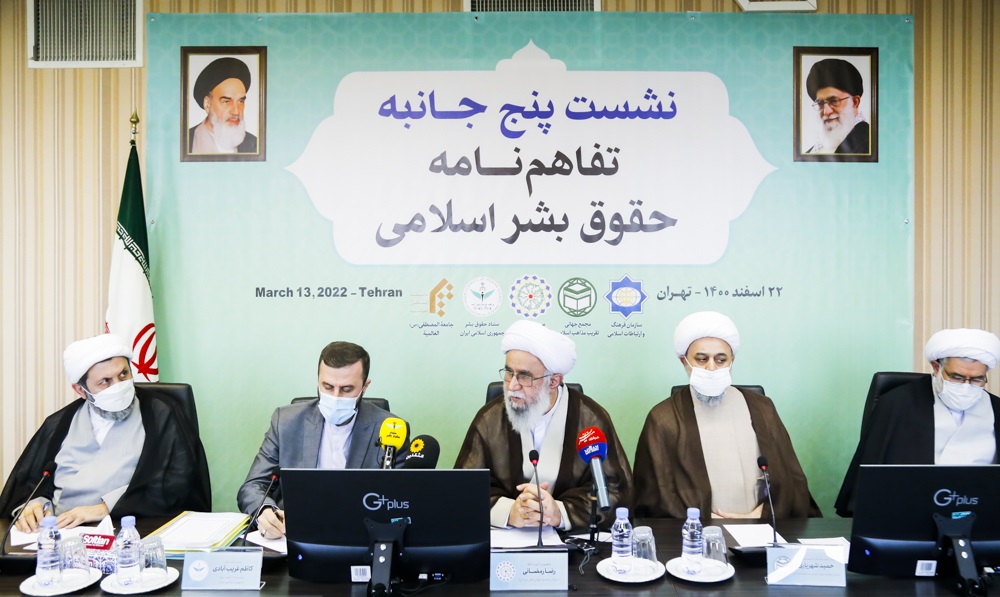
“Those who claim to defend modernity and human rights, with their sinister plans, cause human beings to oppose each other, and the victims of these events are most Muslims,” he emphasized.
“Some raise erroneous and extremist views about Islam,” Ayatollah Ramazani clarified, “What is emphasized in Islam is that the moral, intellectual and spiritual system must be established in human society, and everyone must taste justice.”
“In defense of human rights, the Holy Quran states that if one human being is killed, it is as if all human beings have been killed, and if one person is revived, it is as if all human beings have been revived. Also, after the conquest of Mecca, with all the persecutions that the polytheists had done, the Holy Prophet (p.b.u.h) did not take revenge on anyone and declared the day of the conquest of Mecca as a day of mercy,” said the representative of the people of Gilan in the Assembly of Experts.
“In the name of Islam, some people are unkind and oppressive to this religion. Not long ago, we were witnessing thousands of people beheaded in the name of Allah every day. It is certainly clear that these events are in accordance with the global arrogance in order to discredit the original Islam,” he continued.
“Introducing Islamic civilization in the true sense of the word to today’s world requires software, which itself requires specific international literature,” Ayatollah Ramazani added.
“Islam seeks universal morality, freshness and peaceful living. By developing communication, we can achieve the Islamic utopia, based on certain characteristics, which is social justice,” said the Secretary-General of the AhlulBayt (a.s.) World Assembly.
“Defending human rights, is the headline of all Islamic teachings,” he emphasized.
At the end of his speech, Ayatollah Ramazani considered the holding of this meeting a blessed step and expressed hope that the result of this memorandum, with the cooperation of the five parties and executive follow-up, could promote Islamic literature in the human rights system with international literature.
Dr. Gharibabadi: We are against the politicization of human rights
In this meeting, Dr. Gharibabadi, Deputy for International Affairs and Human Rights of the Judiciary, said, “Islamic human rights is an important issue that has unfortunately been neglected in the international arena.”
“Human rights developed in the 20th century and were drafted in the form of international instruments. But this is not a new phenomenon, and a completely Western innovation, but it has its roots in religions, especially Islam,” he added.
“The philosophy of this five-party memorandum is to use the capacity of five institutions in order to conceptualize and standardize Islamic human rights,” Gharibabadi clarified, “Of course, this does not mean opposition to Human Rights. Rather, its strong and precise meaning is to pay special attention to Islamic human rights issues.”
“The compilation of Islamic Human Rights Encyclopedia is included in the framework of this five-party memorandum, which is one of the most important measures taken. Compiling this encyclopedia is an important step for Islamic countries, and it can be translated for other countries so that when it comes to Islamic human rights, everyone knows what it means,” stated the Deputy for International Affairs and Human Rights of the Judiciary.
“In the field of human rights, and the defense of the rights of Muslims and the oppressed of the world, we are witnessing double standards and discriminatory approaches by international organizations,” he said.
“We oppose the politicization of human rights, and with this Memorandum of Understanding, we strongly oppose the instrumental use of human rights,” Dr. Gharibabadi clarified, “The main goal is to protect the rights of Muslims, Shiites and the oppressed whose voices are not being heard.”
At the end of his speech, he expressed hope that the provisions of this memorandum will be operationalized by synergy and the establishment of an appropriate executive secretariat.
Imanipour: So far, we have not been able to properly define terrorism and resistance
The other speaker at the meeting was Hojat al-Islam Mahdi Imanipour, head of the Islamic Culture and Communication Organization.
At the beginning of his speech, while denouncing the execution of 81 people in Saudi Arabia, he said, “By Islamic human rights, we mean using the natural and human teachings of Islam in defense of the people of the world, especially the oppressed who are not able to defend their rights.”
“We should produce literature in the field of Islamic human rights,” he added, “So far, we have not been able to provide a correct definition of terrorism and resistance. If appropriate literature in these two areas had been defined in a timely and correct manner, today those who fight for the defense of their ideals, their idea, and their land, would not be banned or condemned as terrorism.”
“The five-party memorandum envisions empowering Muslims to defend their rights, so that through education, they can master their duties, and defend their rights,” said the head of the Islamic Culture and Communication Organization.
While emphasizing on the issue of demanding, Imanipour stated, “Why are minorities deprived of their basic rights in countries that claim to respect human rights, and Muslims have difficulty working and studying in the West? Why has anti-Semitism been criminalized with the help of the media, when there is no legal measure to confront anti-Islamism in the world? If anti-Semitism is a crime, then anti-Islam must be a crime. No one pays attention to this point.”
Dr. Shahriari: Human rights in the West is nothing but a colorful mask
As another speaker in the meeting, Hojat al-Islam Dr. Hamid Shahriari, Secretary-General of the World Forum for Proximity of Islamic Schools of Thought, said, “Islamic human rights are based on the divine caliphate. Because man is the caliph of God on earth, and he has the dignity and honor that God has made the whole world in the possession of human beings.”
“The perfect man is the caliph of God and has absolute dignity, rights and duties,” he continued.
“Human rights, with their weak foundations in the Western world, are based entirely on rational consensus, and the weak foundations of human rights in the Western view have led to its instrumental use,” Shahriari added.
“Human rights in the Western world are nothing but a colorful mask, and behind this mask is individualistic liberalism, which is central to the values of the Western world, and when it comes to individual profit, the Western world does not believe in anything,” stated the Secretary-General of the World Forum for Proximity of Islamic Schools of Thought.
“Today, humanity needs Islamic human rights. The ugly face of Western commercialism has led it to use any means, even human rights, to its advantage,” added Dr. Shahriari.
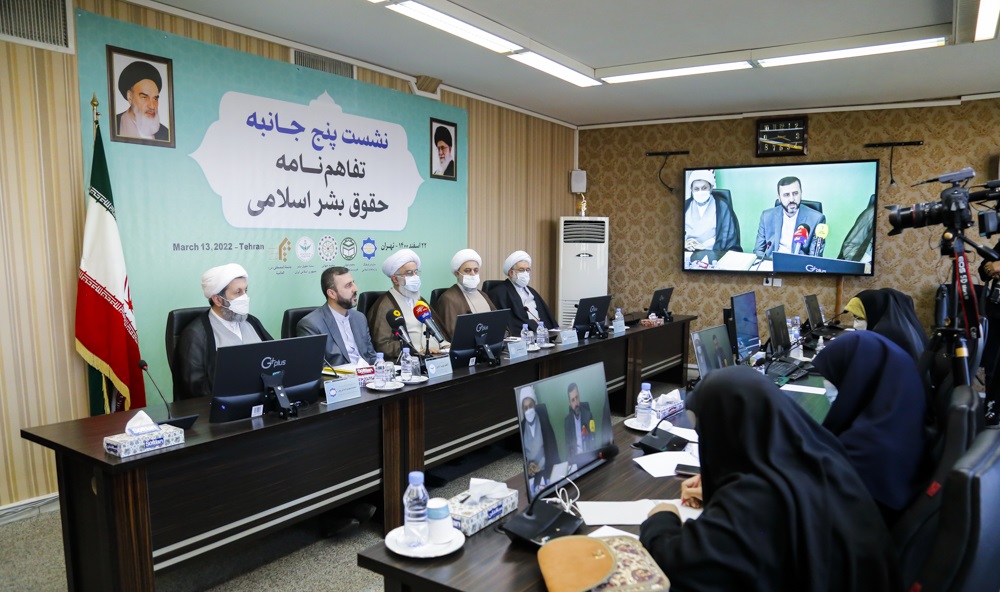
Abbasi: Human dignity is manifested in the Islamic legal system
In this meeting, Hojat al-Islam Ali Abbasi, the president of Al-Mustafa International University (p.b.u.h) said, “Islam’s concern for rights and dignity, and respect for human beings is one of the points that should be considered today, when human rights are talked about more than ever.”
“All human beings have inherent dignity, and this dignity is manifested in the Islamic legal system,” he added, emphasizing the respect to human lives.
“Human rights must be considered in intellectual, epistemological and theoretical dimensions, and it must support the oppressed practically,” added the President of Al-Mustafa (a.s.) International University.
“They take some measure in the name of defending human rights. While they are silent in the face of some injustices, oppressions, and crimes. These behaviors are discriminatory,” he added, referring to the double standards of Western societies in the field of human rights.
At the end of the meeting, the memorandum of understanding was signed by the AhlulBayt (a.s.) World Assembly, the Al-Mustafa (p.b.u.h) International University, the World Forum for Proximity of Islamic Schools of Thought, the Islamic Culture and Communication Organization, and the High Council for Human Rights of the Judiciary.
Some of the provisions of this five-party memorandum are as follows:
- Explaining and promoting the transcendent Islamic concepts and teachings in the field of human rights and human dignity in the international arena,
- Aligning the views and positions of Islamic societies and denominations in the field of Islamic human rights,
- Countering Islamophobia and Shiaphobia, and defending the rights of Muslims and Shiites,
- Collaboration for the authorship and translation of specialized works on Islam and human rights,
- Utilizing the capacity of Ulama and intellectuals of Islamic denominations to standardize and regulate to prevent insults to religious sanctities,
- Cooperation to compile the Islamic Human Rights Encyclopedia and translate it into different languages.
Considering human rights as a trans-organizational issue, the Secretary-General of the AhlulBayt (a.s.) World Assembly added, “Every human conscience considers the defending human rights as an indisputable principle. Today, unfortunately, we face the lack of timely action by international organizations on various issues, including Yemen, Afghanistan, Bahrain, as well as the execution of 81 people in Saudi Arabia, 41 of whom were Shiites.”
On Sunday, March 13, 2022, a five-party meeting was held on the Memorandum of Understanding on Islamic Human Rights between the AhlulBayt (a.s.) World Assembly, the Al-Mustafa (p.b.u.h) International University, the World Forum for Proximity of Islamic Schools of Thought, the Islamic Culture and Communication Organization, and the High Council for Human Rights of the Judiciary.
The meeting, which was held at the AhlulBayt (a.s.) World Assembly in Tehran, was attended by Ayatollah Reza Ramazani, Secretary-General of the AhlulBayt (a.s.) World Assembly, Hojat al-Islam Dr. Hamid Shahriari, the head of the World Forum for Proximity of Islamic Schools of Thought, Hojat al-Islam Mahdi Imanipour, the head of the Islamic Culture and Communication Organization, Dr. Gharibabadi, Deputy for the International Affairs and Human Rights of the Judiciary, and Hojat al-Islam Abbasi, President of Al-Mustafa (p.b.u.h) International University.
Ayatollah Ramazani: Defending human rights, headline of all Islamic teachings
In his speech at the meeting, Ayatollah Reza Ramazani, Secretary-General of the AhlulBayt (a.s.) World Assembly, said, “Islam emphasizes all-round dignity, but some people use deceptive tools and expressions to achieve their goals.”
“Given the emphasis the Islam placed on man, the comprehensiveness of man, and human dignity, it is necessary to work in this field with international literature. We must put aside the passive approach and be actively involved in international law,” he said.
“The five-party memorandum, with an educational-research approach, can pursue research work, especially in various topics in today’s world, and the doubts that people raise about Islam,” stated the Member of the Assembly of Leadership Experts.
“Anti-Islamism, Shiaphobia, and Iranophobia are prevalent in the West, and in the international community, Islam is always associated with untrue attributes. said Ayatollah Ramazani, referring to the many problems that Muslims face in different countries.
“Every human conscience considers the defending human rights as an indisputable principle. Today, unfortunately, we face the lack of timely action by international organizations on various issues, including Yemen, Afghanistan, Bahrain, as well as the execution of 81 people in Saudi Arabia, 41 of whom were Shiites. This is unprecedented in the history of Saudi Arabia. With the tragic events that are taking place in the world, some international organizations only suffice with expressing concern. However, operational measures must be taken to prevent crimes that occur in human society,” added the Secretary-General of the AhlulBayt (a.s.) World Assembly considering human rights as a trans-organizational issue.

“Those who claim to defend modernity and human rights, with their sinister plans, cause human beings to oppose each other, and the victims of these events are most Muslims,” he emphasized.
“Some raise erroneous and extremist views about Islam,” Ayatollah Ramazani clarified, “What is emphasized in Islam is that the moral, intellectual and spiritual system must be established in human society, and everyone must taste justice.”
“In defense of human rights, the Holy Quran states that if one human being is killed, it is as if all human beings have been killed, and if one person is revived, it is as if all human beings have been revived. Also, after the conquest of Mecca, with all the persecutions that the polytheists had done, the Holy Prophet (p.b.u.h) did not take revenge on anyone and declared the day of the conquest of Mecca as a day of mercy,” said the representative of the people of Gilan in the Assembly of Experts.
“In the name of Islam, some people are unkind and oppressive to this religion. Not long ago, we were witnessing thousands of people beheaded in the name of Allah every day. It is certainly clear that these events are in accordance with the global arrogance in order to discredit the original Islam,” he continued.
“Introducing Islamic civilization in the true sense of the word to today’s world requires software, which itself requires specific international literature,” Ayatollah Ramazani added.
“Islam seeks universal morality, freshness and peaceful living. By developing communication, we can achieve the Islamic utopia, based on certain characteristics, which is social justice,” said the Secretary-General of the AhlulBayt (a.s.) World Assembly.
“Defending human rights, is the headline of all Islamic teachings,” he emphasized.
At the end of his speech, Ayatollah Ramazani considered the holding of this meeting a blessed step and expressed hope that the result of this memorandum, with the cooperation of the five parties and executive follow-up, could promote Islamic literature in the human rights system with international literature.
Dr. Gharibabadi: We are against the politicization of human rights
In this meeting, Dr. Gharibabadi, Deputy for International Affairs and Human Rights of the Judiciary, said, “Islamic human rights is an important issue that has unfortunately been neglected in the international arena.”
“Human rights developed in the 20th century and were drafted in the form of international instruments. But this is not a new phenomenon, and a completely Western innovation, but it has its roots in religions, especially Islam,” he added.
“The philosophy of this five-party memorandum is to use the capacity of five institutions in order to conceptualize and standardize Islamic human rights,” Gharibabadi clarified, “Of course, this does not mean opposition to Human Rights. Rather, its strong and precise meaning is to pay special attention to Islamic human rights issues.”
“The compilation of Islamic Human Rights Encyclopedia is included in the framework of this five-party memorandum, which is one of the most important measures taken. Compiling this encyclopedia is an important step for Islamic countries, and it can be translated for other countries so that when it comes to Islamic human rights, everyone knows what it means,” stated the Deputy for International Affairs and Human Rights of the Judiciary.
“In the field of human rights, and the defense of the rights of Muslims and the oppressed of the world, we are witnessing double standards and discriminatory approaches by international organizations,” he said.
“We oppose the politicization of human rights, and with this Memorandum of Understanding, we strongly oppose the instrumental use of human rights,” Dr. Gharibabadi clarified, “The main goal is to protect the rights of Muslims, Shiites and the oppressed whose voices are not being heard.”
At the end of his speech, he expressed hope that the provisions of this memorandum will be operationalized by synergy and the establishment of an appropriate executive secretariat.
Imanipour: So far, we have not been able to properly define terrorism and resistance
The other speaker at the meeting was Hojat al-Islam Mahdi Imanipour, head of the Islamic Culture and Communication Organization.
At the beginning of his speech, while denouncing the execution of 81 people in Saudi Arabia, he said, “By Islamic human rights, we mean using the natural and human teachings of Islam in defense of the people of the world, especially the oppressed who are not able to defend their rights.”
“We should produce literature in the field of Islamic human rights,” he added, “So far, we have not been able to provide a correct definition of terrorism and resistance. If appropriate literature in these two areas had been defined in a timely and correct manner, today those who fight for the defense of their ideals, their idea, and their land, would not be banned or condemned as terrorism.”
“The five-party memorandum envisions empowering Muslims to defend their rights, so that through education, they can master their duties, and defend their rights,” said the head of the Islamic Culture and Communication Organization.
While emphasizing on the issue of demanding, Imanipour stated, “Why are minorities deprived of their basic rights in countries that claim to respect human rights, and Muslims have difficulty working and studying in the West? Why has anti-Semitism been criminalized with the help of the media, when there is no legal measure to confront anti-Islamism in the world? If anti-Semitism is a crime, then anti-Islam must be a crime. No one pays attention to this point.”
Dr. Shahriari: Human rights in the West is nothing but a colorful mask
As another speaker in the meeting, Hojat al-Islam Dr. Hamid Shahriari, Secretary-General of the World Forum for Proximity of Islamic Schools of Thought, said, “Islamic human rights are based on the divine caliphate. Because man is the caliph of God on earth, and he has the dignity and honor that God has made the whole world in the possession of human beings.”
“The perfect man is the caliph of God and has absolute dignity, rights and duties,” he continued.
“Human rights, with their weak foundations in the Western world, are based entirely on rational consensus, and the weak foundations of human rights in the Western view have led to its instrumental use,” Shahriari added.
“Human rights in the Western world are nothing but a colorful mask, and behind this mask is individualistic liberalism, which is central to the values of the Western world, and when it comes to individual profit, the Western world does not believe in anything,” stated the Secretary-General of the World Forum for Proximity of Islamic Schools of Thought.
“Today, humanity needs Islamic human rights. The ugly face of Western commercialism has led it to use any means, even human rights, to its advantage,” added Dr. Shahriari.

Abbasi: Human dignity is manifested in the Islamic legal system
In this meeting, Hojat al-Islam Ali Abbasi, the president of Al-Mustafa International University (p.b.u.h) said, “Islam’s concern for rights and dignity, and respect for human beings is one of the points that should be considered today, when human rights are talked about more than ever.”
“All human beings have inherent dignity, and this dignity is manifested in the Islamic legal system,” he added, emphasizing the respect to human lives.
“Human rights must be considered in intellectual, epistemological and theoretical dimensions, and it must support the oppressed practically,” added the President of Al-Mustafa (a.s.) International University.
“They take some measure in the name of defending human rights. While they are silent in the face of some injustices, oppressions, and crimes. These behaviors are discriminatory,” he added, referring to the double standards of Western societies in the field of human rights.
At the end of the meeting, the memorandum of understanding was signed by the AhlulBayt (a.s.) World Assembly, the Al-Mustafa (p.b.u.h) International University, the World Forum for Proximity of Islamic Schools of Thought, the Islamic Culture and Communication Organization, and the High Council for Human Rights of the Judiciary.
Some of the provisions of this five-party memorandum are as follows:
- Explaining and promoting the transcendent Islamic concepts and teachings in the field of human rights and human dignity in the international arena,
- Aligning the views and positions of Islamic societies and denominations in the field of Islamic human rights,
- Countering Islamophobia and Shiaphobia, and defending the rights of Muslims and Shiites,
- Collaboration for the authorship and translation of specialized works on Islam and human rights,
- Utilizing the capacity of Ulama and intellectuals of Islamic denominations to standardize and regulate to prevent insults to religious sanctities,
- Cooperation to compile the Islamic Human Rights Encyclopedia and translate it into different languages.
